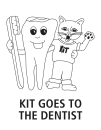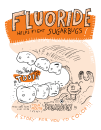Oral Health for Infants and Children
Babies are born with their primary (first) set of teeth formed underneath the gums. These teeth do not usually start to come into the mouth until the child is six to eight months old. By age three, all 20 primary teeth should be in the mouth. A child's primary (first) set of teeth is very important. These teeth help a child eat and speak. They hold space for the permanent teeth.
Around the age of six, a child's mouth will begin to grow to make space for the permanent teeth. Each baby tooth will be replaced by a permanent tooth. The permanent teeth begin to come into the mouth between the age of five and six and will continue to about age twenty one.
It is important for children to develop good oral health habits at an early age. Practicing healthy habits can prevent or reduce tooth decay (cavities) in infants and children
Recommendations:
The American Academy of Pediatric Dentistry (AAPD) recommends that infants see the dentist for their first dental exam within 6 months of getting his/her first tooth or by their first birthday. After the initial dental visit, regular visits, based on the child's oral health needs, are recommended.
Adapted from the Health Resources and Services Administration's (HRSA) Maternal and Child Health Bureau (MCHB) Bright Futures project and Bright Futures Guidelines, the following links will provide a key resource for families to find practical, developmentally appropriate oral health information as their child grows.
Infant and toddler:
Middle childhood and adolescent:
Further Information for Infant and Childhood Oral Health
- Baby Teeth Are Important Poster - Printer Friendly Version (PDF, 223KB, 1pg.)
- About Fluoride
- IFA # 2011-5: Child Sugar-sweetened Beverage Consumption (PDF, 102KB, 1pg.)
- Dietary Habits and Oral Health
- Fluoride Varnish - Frequently Asked Questions
- Guidance for Use of Fluoridated Water for Feeding During Infancy
- Dental Decay Fact Sheet
- Physically Handicapped Children’s Program – Dental Rehabilitation Program
- Injury Prevention
- The Impact of Oral Disease in New York State - December 2006 (PDF, 1.6MB, 129pg.)
- Sugar-Sweetened Beverages (PDF)
- Healthy Beverages
- Resources and Links


